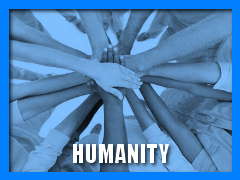For a long time, I’ve been trying to summarize what it is that makes us pirates, a set of basic political principles from where all other policy unfolds. It is not liberalism, it is not socialism, it is not ecosustenance: we are in the process of shaping a new ideology that is required by its time.
While some of the resulting policy may coincide with liberalism, socialism or green policy, it is important to understand and feel that our foundations for arriving at that conclusion is different.
This article has been revised and then published in another location. Please go here for the most recent version.
We’ve been talking about Privacy, Culture and Knowledge for a while. But as it turns out, it’s more than that. It’s also Transparency, it’s Process of Law (summarized below as Humanity), and as we saw the other day, Swarm Economy. All in all, it seems to fall into eight headers. These eight, together with observations, would lead to concrete policy when combined, which in turn would lead to more and more detailed policy. Like a Civilization tech tree which starts at these eight, but for policy.
But first, I need to understand if these eight spokes are what we’re looking for. This, I suggest, is the basic set of Information Policy principles. Thoughts and comments?
 Privacy. The right for every individual to have her life to herself. Authorities are not permitted to collect any data except the most obvious like name and address; when doing so, worst-case scenarios must be assumed. In particular, the individual has the right to keep thoughts, ideas, confidences and conversations away from authorities without asking.
Privacy. The right for every individual to have her life to herself. Authorities are not permitted to collect any data except the most obvious like name and address; when doing so, worst-case scenarios must be assumed. In particular, the individual has the right to keep thoughts, ideas, confidences and conversations away from authorities without asking.
 Transparency. Every individual has the right to examine how authorities are handing the power vested in them by the people. The authorities must not ask for anything as a prerequisite, like identity or money. Every citizen has the right to hold elected politicians accountable and they may not prevent this.
Transparency. Every individual has the right to examine how authorities are handing the power vested in them by the people. The authorities must not ask for anything as a prerequisite, like identity or money. Every citizen has the right to hold elected politicians accountable and they may not prevent this.
 Culture. Everybody shall always be able to create, using all available previous culture, without needing any kind of permission. Everybody shall always be able to share culture with fellow human beings using the technology available. Everybody shall always be able to retrieve, use, remix, publish, perform, and partake in culture.
Culture. Everybody shall always be able to create, using all available previous culture, without needing any kind of permission. Everybody shall always be able to share culture with fellow human beings using the technology available. Everybody shall always be able to retrieve, use, remix, publish, perform, and partake in culture.
 Knowledge. Everybody has the right to use, re-use and build on public knowledge. Nobody has the right to prevent another human being from accessing or using knowledge. Results of all publicly funded research shall be available to the public. Journalism is no longer a profession, but an activity: we depend on people sharing what they see.
Knowledge. Everybody has the right to use, re-use and build on public knowledge. Nobody has the right to prevent another human being from accessing or using knowledge. Results of all publicly funded research shall be available to the public. Journalism is no longer a profession, but an activity: we depend on people sharing what they see.
 Swarm Economy. People are no longer in one lifetime employment. Rather, they have several jobs at one time, some paid and some unpaid, and change jobs frequently. Problematically, the unpaid work is not valued as production at all. Society must adapt to this reality, and particularly find ways to enable valuable volunteer work.
Swarm Economy. People are no longer in one lifetime employment. Rather, they have several jobs at one time, some paid and some unpaid, and change jobs frequently. Problematically, the unpaid work is not valued as production at all. Society must adapt to this reality, and particularly find ways to enable valuable volunteer work.
 Humanity. Nobody may be denied anything on basis of when, where or how they were born. Society and authorities assume good faith. Everybody has the right to express opinions, assemble, and seek and share information without interference. Due process of law, presumption of innocence and resumption of innocence are paramount.
Humanity. Nobody may be denied anything on basis of when, where or how they were born. Society and authorities assume good faith. Everybody has the right to express opinions, assemble, and seek and share information without interference. Due process of law, presumption of innocence and resumption of innocence are paramount.
 Quality Legislation. We take pride in the quality of our work. Every law must be necessary, effective and proportionate. When it doesn’t meet these goals, it shall be removed. When another legislation visibly meets our goals better, we should use that instead of our current one. Political prestige is harmful. Laws are for governing, not for steering.
Quality Legislation. We take pride in the quality of our work. Every law must be necessary, effective and proportionate. When it doesn’t meet these goals, it shall be removed. When another legislation visibly meets our goals better, we should use that instead of our current one. Political prestige is harmful. Laws are for governing, not for steering.
 Pragmatism. We set high ideals and are aware that we’ll likely not reach them in short order. The road from here to a society in tune with our ideals is filled with many intermediate steps, and we must be able to live in each of them. Going an intermediate step does not mean we give up our ultimate goal, but that we move towards the goal.
Pragmatism. We set high ideals and are aware that we’ll likely not reach them in short order. The road from here to a society in tune with our ideals is filled with many intermediate steps, and we must be able to live in each of them. Going an intermediate step does not mean we give up our ultimate goal, but that we move towards the goal.






Falkvinge on Infopolicy: The Eight Spokes of Information Policy?:
For a long time, I’ve been trying to su… http://tinyurl.com/4obagk7
These eight don’t feel like they all belong together. It feels as if I could add a few more without much complications, or remove one without much loss.
I also fail to see what the fundamental difference is between culture and knowledge. They are both about being allowed to build upon what others have created before, and could be lumped together into “ideas”, or something.
> fail to see what the fundamental difference is between culture and knowledge.
knowledge: (i) expertise, and skills acquired by a person through experience or education; the theoretical or practical understanding of a subject; (ii) what is known in a particular field or in total; facts and information; or (iii) be absolutely certain or sure about something.
culture:
* An integrated pattern of human knowledge, belief, and behavior that depends upon the capacity for symbolic thought and social learning
* The set of shared attitudes, values, goals, and practices that characterizes an institution, organization or group
@ Mats Henricson
> fail to see what the fundamental difference is between culture and knowledge.<
Basical cultural creations can be created by an autodidact (although uncommon).
Basical knowledge creations can never be created by an autodidact (it takes a village…)
The middle ground is known as "intuition", but that's basically a save-ass argument for those who want to have one foot planted in each camp but neither firmly rooted in logic and/or verifiability.
I like the fact that you point out that liberalism, socialism or ecosustenance isn’t what we are. That those are not options for us. We need to find something else 🙂
I was thinking of conservatism. 😉
(Joke)
RT @falkvinge The Eight Spokes of Information Policy? http://is.gd/cDHHXe #infopolicy #ppi
Very zen, in many senses. God I love to be witty!
However, FWIW, I like it.
RT @piratbloggar: Falkvinge on Infopolicy: The Eight Spokes of Information Policy?:
For a long time, I’ve been trying to su… http://tinyurl.com/4obagk7
Disagree about the Pragmatism label, since to me Pragmatism is more about ideologic implementation than part of the ideology itself. The other points are all good. 🙂
It is true that it is about the implementation, but it still means that it is ok to set intermediate goals. I believe that is a very, very important parameter.
Yes, it’s a very, very important parameter. However, Per is still right: It belongs in the implementation section and not in the section on core values/ideology – that is clear. “Quality legislation” is more a gray area; is it a core value or an aspect on how to implement the core values?
I think that what binds it all together is that dominating power is fundamentally shifting from economic power to the power of information – democracy needs to adapt if it is to survive.
Another way of summarizing PP ideology is that PP wants to defend the fundamental principles of civil rights, liberty, freedom of speech, and the rule of law.
We, the Pirate Party movement, are alarmed by a Zeitgeist dominated by emerging totalitarian tendencies in all parts of society.
Principles that are cornerstones in a democratic civilized society and have been revered for centuries are dismantled by a stroke of pen without much debate or outrage. This unprincipled opportunism is often euphemistically justified as “flexibility” or the need to adapt to a new time.
We want to defend principles with roots in Magna Carta, Habeas Corpus and the Rule of Law against politicians engaged in a naked power grab.
Another good formulation – especially the first paragraph is a great, concise summary.
Rick, where is freedom of speech incorporated in your eight principles? Maybe it could get in under transparency? Or does it need it’s own spoke?
Excellent thoughts summed up nicely.
I’m trying to consider the swarm economy, but I fail to find any proper way of using it in a modern society. This is definitely what needs most thought.
Skip the swarm economy.
Respecting territorial jurisdiction would be another valuable addition. Some people want Swedish law to apply to Swedish citizens everywhere, regardless of local laws. Particularly in light of the European arrest warrant, it is imperative that people are only expected to follow local laws, or anything forbidden in any country would be punishable here – after a simple extraction procedure.
I don’t think it’s that bad. If you are a Swedish citizen in France you are only supposed to keep with the French *and* Swedish laws., but your danish friend Kristian isn’t, he’s supposed to keep with the Danish and French laws.
I think the idea is far from crazy since it’d add a consequence to, for example, sex tourism in Thailand, or going to Holland to get high. It might also put the pressure on to change the laws here in Sweden to something more sensible, which is a good thing.
But what do you do if the French and the Swedish law disagree and following French law breaks Swedish law or the other way around ?
Which law should you follow then ?
@Anders: rather easy question to answer here. When in conflict you should always go with the law of the land you’re in, unless your own laws set additional restrictions,
Thus, if you are a citizen of country A and visiting country B:
If X is allowed in either country, no problem.
If X is allowed in A but not in B, X is not allowed and A will carry out the sentence.
If X is allowed in B but not in A, X is not allowed and B will carry out the sentence.
If X is not allowed in either country, then it’s reasonable that B carries out the sentence, because you committed the act in B.
So as a general rule: “When in Rome, do as the Romans, except when it would violate your own countrys laws.”
Correction:
If X is allowed in A but not in B, land *B* will carry out the sentence.
If X is allowed in B but not in A, land *A* will carry out the sentence.
Don’t try logical reasoning before having properly woken up. 🙂
If I’m Swedish and drive a car in Britain, should I obey both Swedish and British traffic regulations? :-Þ
I agree that it is a problem when Swedish lawmakers get their head up their rectum and try to say that Swedish law should apply abroad. By logical consequence, an international court can then judge that Iranian Shari’a law applies in Sweden to people who have fled from Iran.
It’s a can-o-worms nightmare that should never have been opened.
Shari law can apply to persons in Sweden, but only to people with iranian citizenship. If you are asking for asylum in another country then that should count as revoking your citizenship of your previous country.
So yes, the problem you describe is possible but I think it will be very limited in scope. Of course, not really for the law either, just don’t think it’s as bad as FRA or the Data Retention directive.
I agree with 7 of the 8, eloquently expressed, The one I have a problem with is Swarm Economy. I appreciate the sentiment, and it IS a problem not valuing the unpaid work, but…. it is hard to see any solution as not being socialist, and requiring significant government, which is pretty contrary to the other “leave us alone” spokes. Socialism, Sweden notwithstanding, doesn’t work, because people are fundamentally greedy bastards. Not everyone, but any solution requiring the vast majority to do something or sacrifice something or pay for something requires coercion. We do not live in an enlightened world.
Now you haven’t given up the old ideological positions yet. If questions or principles have to be abandoned with reference to old ideologies the pirate thinking is not going to be able to come up with optimal new solutions.
Start with the rights of employees instead. It might be easier. Leftist views (at least in Sweden) seem to center around the traditional view of the workplace and a liberal approach often ignore the rights of the individual while favoring the rights of the big organization. None of these views seem to be very piraty to me. A new point of view is desperately needed.
Btw, if the principles should be hands off then minimum legislation is a better principle than quality legislation. But removing swarm economy and changing the legislation point would result in something to close to liberalism to really be very new and exciting. (Well, undoubtedly exciting to some, but not very new.)
Quite the opposite, I would say. The consequences of a Swarm Economy is abandonment of a whole lot of bureaucracy as well as the opposite of coercion.
A Swarm is essentially unmanaged or self-managed, and that’s where its strength lies.
Besides, enabling us to go full-platform in the future requires a starting point on economy and job market. I can’t see any better than the one taking its start in observations of the development of Wikipedia and GNU/Linux (and other FLOSS).
Yes, but there are different social groups interacting here, Rick, and the one abusing bureaucracy and coercion, leading to a top-down hierarchical ladder is not going to adopt a swarm strategy anytime soon.
The unmanaged or self-managed aspects of a swarm are not necessarily its strengths. While they surely limit the possibility of coercion among similarly sized autonomous elements of the swarm… they fragment and lower the size of each and every agent. This might be no problem inside a homogenous swarm, but it is a big problem if the social group that is abusing and maintains its vertical power structures is allowed to put all its pressure against eacha and every member of the swarm one at a time and can coerce them into cooperation with the rest sheepishingly going on minding is independent agent business.
Rick’s description under swarm economy makes me think of what Bangladeshi Nobel Laureate Muhammad Yunus (who started micro finance) wrote:
“By not recognizing the household as a production unit and self-employment as a natural way for people to make a living, the economic literature has missed out on an essential feature of economic reality.”
Is this what is meant with swarm economy? That traditional economic thinking is too narrow-minded and missing out?
[…] Falkvinge blickar framåt och funderar på ideologi och är inne och nosar på en ny piratism. Spännande […]
RT @falkvinge The Eight Spokes of Information Policy? http://is.gd/cDHHXe #infopolicy #ppi
I hope the words “nobody has the right to prevent another human being from accessing or using knowledge” don’t mean that you want to forbid secrets. That would be incompatible with the Privacy “spoke”, and also unenforceable. Perhaps you could rephrase that sentence?
Other than that there’s nothing in this post that I outright disagree with, but Swarm Economy seems rather vague. Despite your earlier post about it, and despite my participating in both Wikipedia and free software, I still don’t know what a swarm economy is. You describe the problem well, but it’s not clear how you want to solve it. I understand that this area still needs a lot of work, and I don’t know whether the outcome will be something I can agree with.
Let’s try to get an understanding of what “knowledge” (not “information”) is aiming at. Maybe the “knowledge” we can aim for is the kind of “knowledge” that would not get deleted from Wikipedia with all the -pedia rules applied?
I believe diversity to be pillar number nine.
The right for every individual to express his diversity in every way that does not effect the same right for other individuals.
The diversity pillar sums up the pirate perspective on sexual preferences, religion, art, debatte and a lot of other things as well.
Diversity is internet.
Privacy + Culture = DIVERSITY
Otherwise, I believe many aspects of the whole can be regrouped as different pillars with different names, and each of us will do that following different break lines that fit their particular and present sensibilities. Lets not make this a competition to make ones own figure more prominently than others 😉 . We might agree to do this in such a way that the actual ideological spearheads of the many different political ideologies remain as absent as possible, at least in their “branded” wording, so that what we finally can agree upon can make up a proper brand that will not easily be confused with other ones. We don’t need to play into the ulterior nitpicking about whether what we come up with is more liberal, or more communist, or more anarchist. It will be Pirate. Period.
What I do not see clear is why the eight spokes have to relate to Information Policy specifically. To be a Pirate should be, or at least soon become, a global attitude. Information Policy is a very important focal point because of the origins we started from, but we need to broaden our mindscape at least so we can logically and ethically create a basis from which each and everyone can make up a sound individual opinion on any matter in such a way that any Pirate can accept it as a sound one even if not specifically the one they would personally pick as favorite given a broader set of equally acceptable alternatives.
Having thought about this for a while, I think you are right. It’s not just diversity of people, approaches, backgrounds and ideas; it’s also diversity of technologies, cryptos etc that give resilience. Polyculture.
I have also spoken to some other people about the importance of the “Humanism” spoke. Almost everything we do radiates from that particular set of values.
So I think I’m going to change the model a bit, move “Humanism” into the hub, and add “Diversity” as a spoke in its place.
On the economy side – what do we say about the sharing economy that is characteristic of the Net? All the ways of giving from your creativity.. And what about all the new ways of earning money from asking a large community for relatively small, not compulsory contributions. And the ways of giving away a basic product, offering a more sophisticated version for money? And the main way of paying for internet access and some other modern services – a fee for entering/having access and free use when you are there?
Yes, if Rick wants a “spoke” to use in the economic debates with the other parties, I find these ideas more plausible than the swarm economy. Maybe it could be a spoke about how the internet and more inter-connectivity transition us into a more knowledge/info based economy and how PP applaud and support and further facilitate these transitions?
. . . then again, that doesn’t really stand out in the political debate . . . but it might be possibly to find a sharp PP edge in these areas, no?
Some points we might want to consider if there is a Canadian Federal Election: http://is.gd/cDHHXe #cdnpoli
Maybe it is better to use another term than the swarm economy, which is much larter than Bitttorrent. There are a number of established terms: collaborative economy, the New Commons, third sector, etc.
These theses are intresting only as a schetch and an embryo to a discussion on what the infocom age will need in terms of political governance.
We are also gooing through a stage in witch parlament needs to be replaced by citicenship.
As loyalty is no longer to nation nor parliament we will need belong to and engagement and level of commitment in order to take responsibillity.
Post capitalism ekonomy will be divided into nonprofit and profit work and infocom will be the only means to handle transactions in a orderly way therefore legislation and social behaviour must be syncronized in order to cope .
Today legislation rules tomorrow behavour rules.
“parlament needs to be replaced by citicenship” – perhaps PP can adopt the ideas of global citizenship? Then there will be no problem to stand out and no shortage of debate!!
Why do we need borders, confinements and restrictions? Hasn’t the internet demonstrated the need for and benefits of a truly open, free and common society? Why can’t we just live together as one race, as one people, as one?
Let’s modernize Cato the Elder’s words about Carthage and define the new mantra: “Ceterum censeo res publica genticus esse delendam” – “Furthermore I think the national state must be destroyed”. Who is with me?
I totally agree… but 😉 …
… the most difficult part is not designing the utopia we truly would like to live in, it is taking into account the possible logistics that might guide the stepwise transformation of a clearly described and accounted for “Present Snaphot” of our human civilization towards that Utopia.
This is what every present ideology has failed to do so far. We are living in a muddy mess… and you can dream of immaculate white wedding dresses for brides you may want to espouse blindfolded… but they wont stay unstained for long unless you design a strategy to gradually clean up the muddyness AND accept you will have to work in the surrounding mud as long as you do not achieve total implementation of the cleansing strategy.
We WONT get anywhere effortless. We can do without national boundaries… but unless we make a serious effort to render them useless (once we are masters of parliament in every country, we can simply agree among us civilized Pirates not to be bothered by these ancient illusions 😉 ) other will stick to them as long as they serve their purposes better than any given alternative.
You’re creating strawman prolonging of original words!
But then again whose swedish feminists that want Swedish law to apply in other contries ARE with you already…
As soon as you prove to me that we will not be tearing down the national fences only to find ourselves defenseless in front of the corporate sharks… I’ll stand at your side.
Tell me Somalia is the paradise you are longing for (take a look at the Trafigura case at WikiLeaks)…
Tell me the banks are not doing whatever they wish and can, and what stops them doing even more…
Rick, I sort of understand what you mean when you say ‘conservative’ (also fits in well with the pragmatism’ spoke) and understand how it differs from neo-liberalism, but it is a loaded term and if used would make it difficult to claim to be neither left nor right. Perhaps it is a term to be used cautiously? Perhaps the point is that much of the government infringement of civil liberties is done at the behest of corporations (where did the pressure come from for TPB trial? Hollywood, without that pressure the Swedish Gov would never have acted). If PP tilts towards a purely anti-government interference position, without balancing this with opposition to interference from large corporations AND simulateously starts talking about conservatism, then a collapse (percieved or real) into the right-wing end of the political spectrum looms…
I’m sorry I wasn’t clearer about this — I was joking when suggesting conservatism. While it could theoretically be motivated, it terms of us just wanting to keep the civil liberties that have been there for centuries, today’s “conservatism” has come to mean “bombing democratic values into as many countries as possible, so our friendly industries can help the oppressed people with their bountiful natural resources”. The ideology of conservatism has become conservation of power, not conservation of values.
So I see us as opposite that particular branch of policy (at least the way it looks today).
PS maybe what I mean in relation to ‘conservatism’ is that piracy should not define itself in terms of other, earlier, political ideologies. ‘Piracy’ is piracy, which, by definition, is not conservatism.
The Eight Spokes of Information Policy? http://bit.ly/fDJyGS
RT @piratepartyau: What makes us pirates? @falkvinge discusses ‘The Eight Spokes of Information Policy’ || http://is.gd/cDHHXe
A great start, and neatly summarizes a lot of issues.
Everything really flows from the ‘Humanity’ spoke, doesn’t it? I feel like ‘freedom of speech’ should almost be the centerpiece of that spoke, since it’s a key balance to the privacy and transparency spokes — raising up the power of the individual (freedom of speech) while limiting the power of the state (privacy and transparency.
Where do individual property rights fall under all this? Not false ‘intellectual property’ laws, but the idea of the individual’s right to own, share, repair, take apart, re-sell, etc. anything that is theirs?
Do equality and social action have a place under the Humanity spoke? How do we protect against one movement, race, gender or class imposing their majority rule on the population?
Finally, I feel like ‘Pragmatism’ and ‘Quality Legislation’ are one and the same idea. We use the best tools we have at the time, but we constantly seek to improve them. If something doesn’t work, we quickly replace it and try again. Same idea, no?
The Eight Spokes of Information Policy?: For a long time, I’ve been trying to summarize what it is that makes us… http://bit.ly/gzhF5W
So about the laws: if I go to Germany and enter the autobahn then my max velocity or speed will be 120 km/h, as beeing the max speed in sweden?
Or use medicals with perscriptions in Sweden (melatonin) that is normal medics in other countrys. (as melatonin is a natural hormone in our bodies)
Try some logic around those. Then sharia laws will be in service for all (until the police checked their passports).
Or that alcohol is (? not shure ?) not allowed in eg. Egypt.
@ Those thinking the swarm economy argument is weaker than the others:
Swarm economy already exists, in abundance and everywhere on the internet, but it’s monetary in a way that’s neither taxable/transferable (hence not recognized by the left) or bankable/fundable (hence not recognized by the right).
One example: Wherever there’s a health problem discussion forum on the internet there’s a swarm. Whenever someone visiting that forum finds a better cure, or a better self treatment, or a better doctor, or a better job than the one provided by his/hers current no-time-off-for-treatment-needs employer, or free and legal music on the internet to download and to listen to while in the waiting room, or the car on the way there, that’s a swarm economy transaction taking place.
The same goes for sports discussion forums, whether gym workout tips forums, running forums for noobs or pros, fan forums for whatever team or hook up chat forums that let you save money by meeting the other sex (or your own if that’s your flavour) where you don’t have to pay an entrance fee to a local establishement and rediculus prizes to buy someone a drink.
The fact that swarm economy is untaxable, untransferable, unbankable and unfundable is alone enough to put the ball in the pirate corner (until the day comes that traditional isms recognize that those traditional values comes much larger but secondary, tertiary or even further down the line of free social networking).
It could be argued that social network sites like Facebook are successfully taxing the untaxable by collecting and monetizing user data, but it’s still at best secondary because if a government, any government, tried to straight up tax citizen’s accounts the way they can tax a physical house or car, then users would just vote with their feet/fingers and take their social networking to other swarms.
As the saying goes, time is money, and time spent online in a swarm is money saved in a bank, which bank doesn’t matter, if it did it would be taxable etc. The only measurable currency, currently, might be time, but to paraphrase an old country title; “wherever I spend my time, that’s my swarm(s)”.
What is said about journalism in the spoke about knowledge, can also be said about culture. -Culture is no longer a profession, but an activity.
I agree that this generalization can be made, but I think it is too abstract to be accepted by any significant amount of the public that culture and knowledge are one and the same.
Journalists and rock starts are not seen as the same profession.
Very nice description of the ideology.
Concerning the persons who are asking about which law applies, it is quite simple : if you’re in Switzerland, you follow the Swiss law ; if you’re in Spain, you follow the Spanish law. That’s the way any lawyer or judge thinks.
The example of the driver in the UK is an excellent picture… if you’re in the UK you’d better drive left if you care about your life.
Concerning Swarm Economy, I totally agree on the principle. The idea of favouring volunteering by according a basic secured income is essential.
For example, Iam volunteer in a shelter for homeless persons ; how much would it cost to the local authority if they’d pay 300 employees to do that?
I can’t understand when people say it’s non-productive and has no financial value… What if homeless persons would be on the road during winter’s nights? If I were them,I’d certainly break a window/door to get warm and dry.
Remember what Dr STALLMAN wrote on the PPI mailing-list concerning the 30 years he spent promoting Free Software and the GNU project ; he seemed really upset to read someone who considered it “not economicaly valuable”. Just count how much it worth in terms of professional coders wages.
And Freedom of speech is under the point “Humanity” as “express opinions”.
Expressing opinions is what I call free speech.
Thanks for the efforts you make in order to spread the Pirate concerns and the advices you give on organisation.
RT @falkvinge The Eight Spokes of Information Policy? http://is.gd/cDHHXe #infopolicy #ppi
I think Rick is doing a better job here !
I look forward to se theese 8 implemented from top to bottom i our party.
It might be easier to sell out party in an election when we have something to sell.
Culture is to sing , knowledge is to study the song.
Build a house from the foundation and up – not from the roof and down.
The Eight Spokes of Information Policy? http://bit.ly/fDJyGS // Interessant el concepte de Swarm Economy… via @falkvinge
[…] enda parti som har en analys som gör viktiga skeenden i samhället idag begripliga, och som har en kompass för hur man ska förhålla sig till dem. Allt eftersom konflikten mellan immaterialrätt och […]